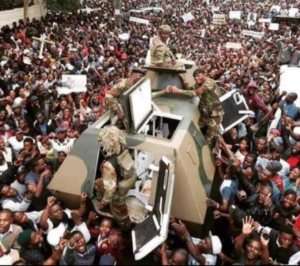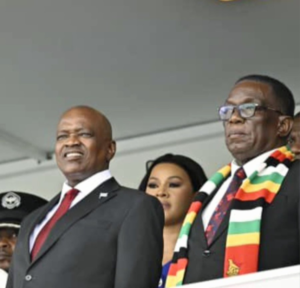THE DANCE OF DECEPTION: HOW HYPOCRISY UNDERMINES DEMOCRACY

In the intricate dance of politics, where steps of possibility and compromise often lead the way, a darker rhythm frequently goes unnoticed – the art of hypocrisy. This shadowy performance has recently found a new protagonist in Sengezo Tshabangu, a controversial figure who has emerged on the political stage with a story that reads like a modern-day Machiavellian drama. Tshabangu, claiming the mantle of a compromised opposition secretary-general, didn’t rise through the ranks by the conventional democratic process but ascended to the senate through a strategy laced with subterfuge, deceit, and outright lies.
Tshabangu’s journey to power is a narrative of political maneuvering so intricate it would give Machiavelli pause. By masterminding the recall of genuinely elected officials – including Members of Parliament, senators, councillors, and even mayors – Tshabangu cleared his path to ascendancy, paving the way for himself and his associates, all of whom had been previously rejected by the electorate. This strategic coup was not merely a display of political ambition but an outright assault on democracy, executed with the finesse of a chess grandmaster playing dirty politics.
The irony of Tshabangu’s rise is as palpable as it is bitter. Despite his vocal criticisms of the former Citizens Coalition for Change (CCC) leader Nelson Chamisa for allegedly imposing candidates—a claim that held some merit – Tshabangu himself was catapulted into his position through a similar imposition. This hypocritical maneuver was bolstered by a formidable alliance that spanned the executive, parliament, the judiciary, and even state security agents, all unified with the objective of securing personal benefits for Tshabangu and his allies, as well as for the ruling Zanu PF party.
Tshabangu’s political strategy, underscored by hypocrisy, is reflective of a more significant malaise that infects the political landscape. While he and his cohorts might justify their actions as a means to an end, such rationalizations crumble under ethical scrutiny. Hypocrisy, regardless of its guise or justification, cannot serve as a foundation for reclaiming moral high ground. It erodes the bedrock of trust, undermines the principles of democracy, and, in the end, benefits only those who deploy it for personal gain.
The implications of Tshabangu’s machinations extend beyond the immediate political upheaval. By substituting duly elected representatives with figures outrightly rejected by the public, a dangerous precedent is established. It is a grim reminder that democracy can be subverted, not just through blatant acts of coercion or violence, but through the more subtle, yet equally destructive, forces of hypocrisy and deceit.
As the dust settles on this tumultuous chapter of political machinations, the temporary victors appear to be Tshabangu, his allies, and the Zanu PF party. However, the real cost of their so-called victory is a deep wound inflicted on the very essence of democratic governance. In their relentless pursuit of power, the tenets of fair representation, accountability, and the sovereign will of the people have been egregiously ignored, rendering democracy the most significant casualty.
This narrative of power, hypocrisy, and the systematic undermining of democratic values serves as a stark cautionary tale. It compels us to scrutinize the nature of the politics we support and the means through which we permit leaders to rise to prominence. As long as hypocrisy remains a weapon in the political armory, democracy will continue to be under siege – a fragile institution always vulnerable to those who wish to exploit it for their own selfish objectives.



